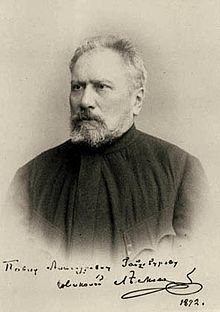The villain of Askalon
The villain of Askalon ( Russian Аскалонский злодей , Askalonski slodei ) is a short story by the Russian writer Nikolai Leskov , which appeared in the November issue of the Moscow magazine Russkaja Mysl in 1889 .
content
During the reign of Emperor Justinian , that was in the middle of the 6th century AD, the 35-year-old rich merchant Thalalei lived in Ascalon with his beautiful 24-year-old wife Tenia. Both had two young children. Thalalei was drawn to Christianity but had not really understood it. Tenia, a pagan, still clung to the old faith, that of her late father, the Anubis priest Polyphron. In view of the new religion, the father had chosen suicide.
In his greed for money, Thalalei had thirty ships loaded. The flotilla sank in a storm off the Libyan Cyrene . Only Thalalei's ship returned home. Angry Ascalonians demanded the equivalent of their irretrievably sunken goods from the unfortunate seafarer; commissioned the cunning Askalonian debt collector Tiwurtius with the case. Tiwurtius confiscated all of Thalalei's property without delay. Since the proceeds were only a fraction of the value of the lost goods, Tiwurtius had Thalalei thrown into the prison in Askalon. Shortly before, the villain Anastasius, who along with his gang had robbed and murdered on the beach in Askalon, had been thrown into the same prison.
The governor Milius traveled from Damascus because Anastasius was to be beheaded.
Tenia now lives with the children and her mother-in-law Publia outside the city in a reed hut. When the beautiful woman brings her Thalalei food, the libertine Milius, who is visiting prison, desires her. For a night of love, he offers Tenia so many gold pieces that she could use it to pay off the intrusive creditors and thalalei could easily buy Thalalei out of prison. Tenia is not for sale. Tiwurtius incites the prison inmates and all the Ascalonians materially affected by the shipwreck against Tenia. After all, almost everyone who meets Tenia blatantly invites the steadfast wife to do that little favor Mylius wished for. In the end, even Thalalei and his mother Publia join the shameful demand. Tenia remains steadfastly loyal to Thalalei. When the two children are threatened with starvation in the above-mentioned reed hut, it is only the murderer Anastasius who gives Tenia and Thalalei of his meager bread ration. It is also Anastasius who turns the fortunes of Tenias and her husband for the better. Chained to the prison wall, Anastasius puts Tiwurtius and the prison keeper Rawula out of action with powerful blows from his chains. The three are killed in a prison fire. During the fire, Milius is stabbed to death outside the prison by two men from Anastasius's gang. Shortly before his death, Anastasius had betrayed his gold hiding place to Tenia. The woman had unearthed the treasure and with this ransom could buy her husband and other Ascalonians in custody from Milius.
Four bad guys
So who is the eponymous villain? The reader can choose between the ruthless Tiwurtius and the prison locker Rawula, who is furious with the whip. Milius could also be considered. Anastasius scolds him as a "culprit of Askalon". But Leskov calls the murderer Anastasius a villain.
reception
- The historian Klyuchevsky was one of the first readers to endorse the legend.
German-language editions
Output used:
- The villain of Askalon. P. 7–131 in: Nikolai Lyesskow: The villain of Askalon. The Scarecrow. Two stories. Translated from the Russian by Karl Nötzel . 236 pages. Verlag Karl Alber , Freiburg 1949
Web links
- The text online at Lib.ru / Classic (Russian)
- Entry in the Laboratory of Fantastics (Russian)
- Entries in WorldCat
Remarks
- ↑ If Justinian II was meant, the action time would be at the end of the 7th century AD.
- ↑ To be more precise: In the Askalon prison, the urge to go is done on site. As soon as the shortage of air becomes life-threatening, the prisoners are taken out into the fresh air for a short time. The prison is then fumigated with a brush fire.
Individual evidence
- ↑ Edition used, p. 77, 9. Zvo
- ↑ Russian Примечания - Notes
